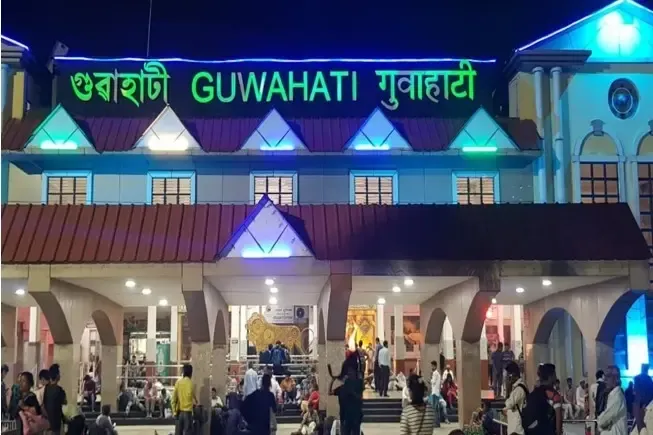Is Guwahati Railway Station Set to Become India's First Plastic-Recyclable Station?

Synopsis
Key Takeaways
- Guwahati railway station will be India's first fully plastic recyclable station.
- A tripartite MoU is facilitating the transformation.
- Innovative waste management systems are being implemented.
- Community engagement initiatives are promoting environmental awareness.
- The model will be extended to nine other stations.
Guwahati, Oct 7 (NationPress) - The Northeast Frontier Railway (NFR) has initiated groundbreaking efforts across its network aimed at enhancing environmental sustainability and fulfilling the goals of the Indian Railways' Green Mission 2030, as announced by officials on Tuesday.
The Chief Public Relations Officer (CPRO) of NFR, Kapinjal Kishore Sharma, stated that a key element of these efforts is the conversion of Guwahati railway station into India's first station that is entirely plastic recyclable, marking a significant step forward in sustainable railway practices.
This ambitious project is being facilitated through a tripartite Memorandum of Understanding (MoU) involving NFR, the Assam Pollution Control Board, and a licensed local recycler, with technical backing from the Indian Institute of Technology (IIT), Guwahati.
The initiative integrates scientific innovation, adherence to regulations, and practical implementation to establish a model that can be replicated for efficient plastic waste management throughout the region, according to the CPRO.
As part of this program, Sharma mentioned that NFR has adopted a thorough plastic waste management approach, which comprises color-coded dustbins for waste segregation, bottle crushing machines, composting facilities, and QR code-based monitoring systems for real-time efficiency tracking.
Additionally, eco-friendly compostable bags formulated by IIT Guwahati have replaced single-use plastics on trains, leading to a remarkable reduction in plastic waste.
To further raise awareness and encourage community participation, NFR has organized several initiatives including "Waste-to-Art" exhibitions, street plays (Nukkad Nataks), Scouts and Guides awareness campaigns, and digital outreach at various stations.
The Chief Spokesman for NFR noted that these endeavors have successfully cultivated environmental awareness among passengers, vendors, and railway personnel.
Consequently, vendor compliance has achieved a 100 percent rate, complaints regarding passenger cleanliness have decreased by 60 percent, and the overall atmosphere of the station has significantly improved.
Building on these successes, NFR plans to replicate the 100 percent plastic recyclable station model at an additional nine stations throughout its network.
This initiative aims to enhance the cleanliness, greenness, and environmental responsibility of the entire zone, as stated by Sharma.
The Northeast Frontier Railway operates within the northeastern states, as well as in seven districts of West Bengal and five districts of north Bihar.









